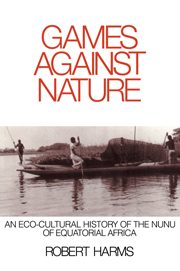Book contents
- Frontmatter
- Contents
- List of Maps
- Preface
- Preface for the paperback edition
- 1 Introduction
- 2 The Antecedents
- 3 The Tactics
- 4 The Strategies
- 5 The Drylands
- 6 The River
- 7 The Core
- 8 The Region
- 9 The Traders
- 10 The Troubles
- 11 The Opportunities
- 12 The Battle
- 13 Conclusion: Nature and Culture
- Abbreviations
- Sources Cited
- Archives
- Index
7 - The Core
Published online by Cambridge University Press: 03 November 2009
- Frontmatter
- Contents
- List of Maps
- Preface
- Preface for the paperback edition
- 1 Introduction
- 2 The Antecedents
- 3 The Tactics
- 4 The Strategies
- 5 The Drylands
- 6 The River
- 7 The Core
- 8 The Region
- 9 The Traders
- 10 The Troubles
- 11 The Opportunities
- 12 The Battle
- 13 Conclusion: Nature and Culture
- Abbreviations
- Sources Cited
- Archives
- Index
Summary
AT THE SAME TIME that people on the frontiers were developing innovative strategies to exploit new micro-environments, the water lords in the older core regions were using defensive strategies to try to hold on to their estates. Until the early nineteenth century, the core areas of the swamps had maintained a precarious stability as excess people were thrown off toward the periphery. This practice had allowed the water lords to maintain control of their land and had provided the remaining landless people with the possibility of making their livelihoods as clients. The filling up of the prime fishing grounds rendered possibility of moving to open land less and less feasible.
The limit of eastward expansion was marked by the villages of Nkuboko, located on dry land just beyond the farthest extension of the flood waters. Further movement to the east would have required abandoning fishing altogether, a prospect that Nunu males found unpalatable. Power over people was related to power over fish, and even the poorest fisherman in the swamps participated in the ethos of the fishing life. When the limits of the inundated zone were reached, expansion came to an end. No new villages were established inland. In time the best fishing grounds along the streams were claimed, and Nkuboko began to suffer the same types of inequalities found in the swamps.
- Type
- Chapter
- Information
- Games against NatureAn Eco-Cultural History of the Nunu of Equatorial Africa, pp. 117 - 134Publisher: Cambridge University PressPrint publication year: 1988



